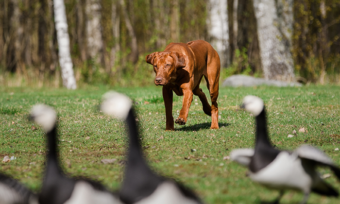
In this article we cover:
- Why eating grass is good for dogs
- Why do dogs vomit after eating grass?
- Signs of an underlying health condition
- Should I stop my dog from eating grass?
- Does my dog need pet insurance?
Why do dogs eat grass and weeds and then throw up? Granted, they don’t vomit every time, but it is still often the case.
Dogs eat a lot of weird things, usually things they shouldn’t be ingesting. From socks and tennis balls, to human medication and other animals’ excrement, if a dog can eat it, they probably will.
Although the eating poop part is pretty gross, could these unusual dietary habits simply be a rite of passage from pup to senior? If you think about it, kids tend to also eat a lot of unsavoury things. Luckily, poop is generally not one of them.
Child-care literature suggests trialling strange foods-that-aren’t-foods is an all too necessary part of growing a healthy immune system. So, maybe dogs are just following suit?
Why eating grass is good for dogs
Studies suggest dogs may benefit from eating grass and accompanying weeds for a number of reasons, including:
- Fire-rich diet
- Improves digestion
- Flushes out parasites such as intestinal worms
- Flushing out harmful substances
- Enjoyment (vets and scientists believe some dogs like the taste!)
- Entertainment
After all, a high-fibre diet is good for people. So, we can consider that perhaps it’s good for dogs, too.
Why do dogs vomit after eating grass?
Research shows that 79% of dogs eat grass, but only 22% vomit afterwards. This suggests that while consuming grass can lead to vomiting, clearing out the digestive tract via purging isn’t the only reasons for dogs eating grass.
Younger dogs tend to have more interest in lawn-mowing diets than older dogs, so guzzling some greens might be a way of dogs trying out new foods.
Signs of an underlying health condition
While eating grass is a common behaviour and generally not associated with illness, watch out for any increase in your dog’s grass intake. It’s also important to keep a lookout for any accompanying physical changes. A sudden change could point to an underlying illness, such as inflammatory bowel disease or pancreatitis. Signs to look out for include:
- Vomiting
- Diarrhoea
- Weight loss
- Excessive drooling or lip-licking
- Decreased appetite
- Changes in fur
If you dogs shows any of these symptoms and is also eating grass, they might be proactively trying to self-medicate. This will require a professional diagnoses by a vet.
Should I stop my dog from eating grass?
Despite many dogs being able to vomit grass, they should be kept away from other plants that could cause them harm. Research what plants are poisonous to dogs and fence them off or remove them from your property.
If you want to replace your dog’s greens with a healthier option, or you’re living in an apartment without immediate grass access, try growing wheatgrass.
Wheatgrass grows well as a porch plant and doubles as a fresh source of gluten-free fibre. Plus, it packs health benefits like enzymes, vitamins and minerals, which are all conducive to a healthy pet.
Does my dog need pet insurance?
Whether or not your dog is a grass eater, it’s important that they’re protected. Remember, underlying GI diseases don’t always present symptoms immediately. Left unchecked these can lead to serious complications, which may require hospitalisation.
Planning ahead to cover vet bills can do than save you money, it can help put your mind at ease and keep your pet safe.
Compare Pet Insurance Providers with Canstar
About the reviewer of this page
This report was reviewed by Canstar Content Producer, Caitlin Bingham. Caitlin is an experienced writer whose passion for creativity led her to study communication and journalism. She began her career freelancing as a content writer, before joining the Canstar team.
Enjoy reading this article?
You can like us on Facebook and get social, or sign up to receive more news like this straight to your inbox.
By subscribing you agree to the Canstar Privacy Policy






Share this article